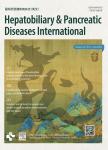Factors associated with failure of enhanced recovery after surgery program in patients undergoing pancreaticoduodenectomy
Factors associated with failure of enhanced recovery after surgery program in patients undergoing pancreaticoduodenectomy作者机构:Department of Hepatobiliary and Pancreatic Surgerythe First Affiliated HospitalZhejiang University School of MedicineHangzhou 310003China Department of Hepatobiliary and Pancreatic Surgerythe Second Affliated HospitalZhejiang University School of MedicineHangzhou 310009China Key Laboratory of Pancreatic Disease of Zhejiang ProvinceHangzhou 310003China
出 版 物:《Hepatobiliary & Pancreatic Diseases International》 (国际肝胆胰疾病杂志(英文版))
年 卷 期:2020年第19卷第1期
页 面:51-57页
核心收录:
学科分类:1002[医学-临床医学] 100210[医学-外科学(含:普外、骨外、泌尿外、胸心外、神外、整形、烧伤、野战外)] 10[医学]
基 金:supported by grants from the Project of Medical and Health Technology Platform of Zhejiang Province(2017RC003) the National High Technology Research and Development Pro-gram of China(SS2015AA020405) the General Program of the National Natural Science Foundation of China(81871925) the General Program of the National Natural Science Foundation of China(81672337) the Key Innovative Team for the Diagnosis and Treatment of Pancreatic Cancer of Zhejiang Province(2013TD06) the Key Program of National Natural Science Foundation of China(81530079) the Key Research and Development Project of Zhejiang Province(2015C03044)
主 题:Enhanced recovery after surgery ERAS Pancreaticoduodenectomy Failure of ERAS Risk factors
摘 要:Background: The enhanced recovery after surgery (ERAS) protocol is an evidence-based perioperative care program aimed at reducing surgical stress response and accelerating recovery. However, a small propor- tion of patients fail to bene t from the ERAS program following pancreaticoduodenectomy. This study aimed to identify the risk factors associated with failure of ERAS program in pancreaticoduodenectomy. Methods: Between May 2014 and December 2017, 176 patients were managed with ERAS program fol-lowing pancreaticoduodenectomy. ERAS failure was indicated by prolonged hospital stay, unplanned read- mission or unplanned reoperation. Demographics, postoperative recovery and compliance were compared of those ERAS failure groups to the ERAS success group. Results: ERAS failure occurred in 59 patients, 33 of whom had prolonged hospital stay, 18 were readmitted to hospital within 30 days after discharge, and 8 accepted reoperation. Preoperative American Society of Anesthesiologists (ASA) score of ≥III (OR = 2.736;95% CI: 1.276 6.939;P=0.028) and albumin (ALB) level of 70 years) were on a high risk of unplanned reoperation (62.5% vs. 23.1%, P=0.026). Patients with prolonged hospital stay and unplanned reoperation had delayed intake and increased intolerance of oral foods. Prolonged stay patients got off bed later than ERAS success patients did (65h vs. 46h, P =0.012). Unplanned reoperation patients tended to experience severer pain than ERAS success patients did (3 score vs. 2 score, P =0.035). Conclusions: Patients with high ASA score, low ALB level or age 70 years were at high risk of ERAS failure in pancreaticoduodenectomy. These preoperative demographic and clinical characteristics are important determinants to obtain successful postoperative recovery in ERAS program.



